
The political impasse caused by the Wednesday’s military action in Zimbabwe has continued to elicit reactions from different parts of the world, with many African leaders calling for the respect for the constitution.
Robert Gabriel Mugabe, a Zimbabwean revolutionary and politician who has been President of Zimbabwe since the Southern African country gained independence and changed its name from Southern-Rhodesia, in 1980 remained the only president Zimbabweans have known.
He first led as Prime Minister till 1987, when the constitution was amended and he transmuted to become president.
Mugabe had always been politically active, joining the pro-independence National Democratic Party in 1960 when he was in his mid-thirties.
The party reformed as the Zimbabwe African People’s Union, ZAPU.
He left three years later to form the Zimbabwe African National Union, ZANU.
Both ZANU and ZAPU were officially banned in 1964, after a long spell of political unrest. It was during this time that Mugabe was arrested and imprisoned indeterminately.
On release, he fled to Mozambique, established his leadership of ZANU, and oversaw the party’s role in the Rhodesian Bush War, a 35-year civil war that saw him fight against white rule.
The war ended with United Kingdom-mediated peace negotiations that took place in 1979, resulting in the Lancaster House Agreement.
Southern Rhodesia gained independence the following year, and became the independent Republic of Zimbabwe.
Mugabe’s ZANU won most of the parliamentary Seats and Mugabe became the prime minister.
He quickly moved to carry out an initially popular land redistribution programme, in an effort to equitably distribute land between blacks and whites.
His government’s land reform would become unpopular with the west, as well as his view on homosexuality.
Zimbabwe’s economy steadily deteriorated in the 90s, the west heaped sanctions, and he was accused of holding on tight to power, including working to make his wife, Grace Mugabe succeed him.

The political impasse caused by the Wednesday’s military action in Zimbabwe has continued to elicit reactions from different parts of the world, with many African leaders calling for the respect for the constitution.
Robert Gabriel Mugabe, a Zimbabwean revolutionary and politician who has been President of Zimbabwe since the Southern African country gained independence and changed its name from Southern-Rhodesia, in 1980 remained the only president Zimbabweans have known.
He first led as Prime Minister till 1987, when the constitution was amended and he transmuted to become president.
Mugabe had always been politically active, joining the pro-independence National Democratic Party in 1960 when he was in his mid-thirties.
The party reformed as the Zimbabwe African People’s Union, ZAPU.
He left three years later to form the Zimbabwe African National Union, ZANU.
Both ZANU and ZAPU were officially banned in 1964, after a long spell of political unrest. It was during this time that Mugabe was arrested and imprisoned indeterminately.
On release, he fled to Mozambique, established his leadership of ZANU, and oversaw the party’s role in the Rhodesian Bush War, a 35-year civil war that saw him fight against white rule.
The war ended with United Kingdom-mediated peace negotiations that took place in 1979, resulting in the Lancaster House Agreement.
Southern Rhodesia gained independence the following year, and became the independent Republic of Zimbabwe.
Mugabe’s ZANU won most of the parliamentary Seats and Mugabe became the prime minister.
He quickly moved to carry out an initially popular land redistribution programme, in an effort to equitably distribute land between blacks and whites.
His government’s land reform would become unpopular with the west, as well as his view on homosexuality.
Zimbabwe’s economy steadily deteriorated in the 90s, the west heaped sanctions, and he was accused of holding on tight to power, including working to make his wife, Grace Mugabe succeed him.

The political impasse caused by the Wednesday’s military action in Zimbabwe has continued to elicit reactions from different parts of the world, with many African leaders calling for the respect for the constitution.
Robert Gabriel Mugabe, a Zimbabwean revolutionary and politician who has been President of Zimbabwe since the Southern African country gained independence and changed its name from Southern-Rhodesia, in 1980 remained the only president Zimbabweans have known.
He first led as Prime Minister till 1987, when the constitution was amended and he transmuted to become president.
Mugabe had always been politically active, joining the pro-independence National Democratic Party in 1960 when he was in his mid-thirties.
The party reformed as the Zimbabwe African People’s Union, ZAPU.
He left three years later to form the Zimbabwe African National Union, ZANU.
Both ZANU and ZAPU were officially banned in 1964, after a long spell of political unrest. It was during this time that Mugabe was arrested and imprisoned indeterminately.
On release, he fled to Mozambique, established his leadership of ZANU, and oversaw the party’s role in the Rhodesian Bush War, a 35-year civil war that saw him fight against white rule.
The war ended with United Kingdom-mediated peace negotiations that took place in 1979, resulting in the Lancaster House Agreement.
Southern Rhodesia gained independence the following year, and became the independent Republic of Zimbabwe.
Mugabe’s ZANU won most of the parliamentary Seats and Mugabe became the prime minister.
He quickly moved to carry out an initially popular land redistribution programme, in an effort to equitably distribute land between blacks and whites.
His government’s land reform would become unpopular with the west, as well as his view on homosexuality.
Zimbabwe’s economy steadily deteriorated in the 90s, the west heaped sanctions, and he was accused of holding on tight to power, including working to make his wife, Grace Mugabe succeed him.

The political impasse caused by the Wednesday’s military action in Zimbabwe has continued to elicit reactions from different parts of the world, with many African leaders calling for the respect for the constitution.
Robert Gabriel Mugabe, a Zimbabwean revolutionary and politician who has been President of Zimbabwe since the Southern African country gained independence and changed its name from Southern-Rhodesia, in 1980 remained the only president Zimbabweans have known.
He first led as Prime Minister till 1987, when the constitution was amended and he transmuted to become president.
Mugabe had always been politically active, joining the pro-independence National Democratic Party in 1960 when he was in his mid-thirties.
The party reformed as the Zimbabwe African People’s Union, ZAPU.
He left three years later to form the Zimbabwe African National Union, ZANU.
Both ZANU and ZAPU were officially banned in 1964, after a long spell of political unrest. It was during this time that Mugabe was arrested and imprisoned indeterminately.
On release, he fled to Mozambique, established his leadership of ZANU, and oversaw the party’s role in the Rhodesian Bush War, a 35-year civil war that saw him fight against white rule.
The war ended with United Kingdom-mediated peace negotiations that took place in 1979, resulting in the Lancaster House Agreement.
Southern Rhodesia gained independence the following year, and became the independent Republic of Zimbabwe.
Mugabe’s ZANU won most of the parliamentary Seats and Mugabe became the prime minister.
He quickly moved to carry out an initially popular land redistribution programme, in an effort to equitably distribute land between blacks and whites.
His government’s land reform would become unpopular with the west, as well as his view on homosexuality.
Zimbabwe’s economy steadily deteriorated in the 90s, the west heaped sanctions, and he was accused of holding on tight to power, including working to make his wife, Grace Mugabe succeed him.

The political impasse caused by the Wednesday’s military action in Zimbabwe has continued to elicit reactions from different parts of the world, with many African leaders calling for the respect for the constitution.
Robert Gabriel Mugabe, a Zimbabwean revolutionary and politician who has been President of Zimbabwe since the Southern African country gained independence and changed its name from Southern-Rhodesia, in 1980 remained the only president Zimbabweans have known.
He first led as Prime Minister till 1987, when the constitution was amended and he transmuted to become president.
Mugabe had always been politically active, joining the pro-independence National Democratic Party in 1960 when he was in his mid-thirties.
The party reformed as the Zimbabwe African People’s Union, ZAPU.
He left three years later to form the Zimbabwe African National Union, ZANU.
Both ZANU and ZAPU were officially banned in 1964, after a long spell of political unrest. It was during this time that Mugabe was arrested and imprisoned indeterminately.
On release, he fled to Mozambique, established his leadership of ZANU, and oversaw the party’s role in the Rhodesian Bush War, a 35-year civil war that saw him fight against white rule.
The war ended with United Kingdom-mediated peace negotiations that took place in 1979, resulting in the Lancaster House Agreement.
Southern Rhodesia gained independence the following year, and became the independent Republic of Zimbabwe.
Mugabe’s ZANU won most of the parliamentary Seats and Mugabe became the prime minister.
He quickly moved to carry out an initially popular land redistribution programme, in an effort to equitably distribute land between blacks and whites.
His government’s land reform would become unpopular with the west, as well as his view on homosexuality.
Zimbabwe’s economy steadily deteriorated in the 90s, the west heaped sanctions, and he was accused of holding on tight to power, including working to make his wife, Grace Mugabe succeed him.

The political impasse caused by the Wednesday’s military action in Zimbabwe has continued to elicit reactions from different parts of the world, with many African leaders calling for the respect for the constitution.
Robert Gabriel Mugabe, a Zimbabwean revolutionary and politician who has been President of Zimbabwe since the Southern African country gained independence and changed its name from Southern-Rhodesia, in 1980 remained the only president Zimbabweans have known.
He first led as Prime Minister till 1987, when the constitution was amended and he transmuted to become president.
Mugabe had always been politically active, joining the pro-independence National Democratic Party in 1960 when he was in his mid-thirties.
The party reformed as the Zimbabwe African People’s Union, ZAPU.
He left three years later to form the Zimbabwe African National Union, ZANU.
Both ZANU and ZAPU were officially banned in 1964, after a long spell of political unrest. It was during this time that Mugabe was arrested and imprisoned indeterminately.
On release, he fled to Mozambique, established his leadership of ZANU, and oversaw the party’s role in the Rhodesian Bush War, a 35-year civil war that saw him fight against white rule.
The war ended with United Kingdom-mediated peace negotiations that took place in 1979, resulting in the Lancaster House Agreement.
Southern Rhodesia gained independence the following year, and became the independent Republic of Zimbabwe.
Mugabe’s ZANU won most of the parliamentary Seats and Mugabe became the prime minister.
He quickly moved to carry out an initially popular land redistribution programme, in an effort to equitably distribute land between blacks and whites.
His government’s land reform would become unpopular with the west, as well as his view on homosexuality.
Zimbabwe’s economy steadily deteriorated in the 90s, the west heaped sanctions, and he was accused of holding on tight to power, including working to make his wife, Grace Mugabe succeed him.

The political impasse caused by the Wednesday’s military action in Zimbabwe has continued to elicit reactions from different parts of the world, with many African leaders calling for the respect for the constitution.
Robert Gabriel Mugabe, a Zimbabwean revolutionary and politician who has been President of Zimbabwe since the Southern African country gained independence and changed its name from Southern-Rhodesia, in 1980 remained the only president Zimbabweans have known.
He first led as Prime Minister till 1987, when the constitution was amended and he transmuted to become president.
Mugabe had always been politically active, joining the pro-independence National Democratic Party in 1960 when he was in his mid-thirties.
The party reformed as the Zimbabwe African People’s Union, ZAPU.
He left three years later to form the Zimbabwe African National Union, ZANU.
Both ZANU and ZAPU were officially banned in 1964, after a long spell of political unrest. It was during this time that Mugabe was arrested and imprisoned indeterminately.
On release, he fled to Mozambique, established his leadership of ZANU, and oversaw the party’s role in the Rhodesian Bush War, a 35-year civil war that saw him fight against white rule.
The war ended with United Kingdom-mediated peace negotiations that took place in 1979, resulting in the Lancaster House Agreement.
Southern Rhodesia gained independence the following year, and became the independent Republic of Zimbabwe.
Mugabe’s ZANU won most of the parliamentary Seats and Mugabe became the prime minister.
He quickly moved to carry out an initially popular land redistribution programme, in an effort to equitably distribute land between blacks and whites.
His government’s land reform would become unpopular with the west, as well as his view on homosexuality.
Zimbabwe’s economy steadily deteriorated in the 90s, the west heaped sanctions, and he was accused of holding on tight to power, including working to make his wife, Grace Mugabe succeed him.

The political impasse caused by the Wednesday’s military action in Zimbabwe has continued to elicit reactions from different parts of the world, with many African leaders calling for the respect for the constitution.
Robert Gabriel Mugabe, a Zimbabwean revolutionary and politician who has been President of Zimbabwe since the Southern African country gained independence and changed its name from Southern-Rhodesia, in 1980 remained the only president Zimbabweans have known.
He first led as Prime Minister till 1987, when the constitution was amended and he transmuted to become president.
Mugabe had always been politically active, joining the pro-independence National Democratic Party in 1960 when he was in his mid-thirties.
The party reformed as the Zimbabwe African People’s Union, ZAPU.
He left three years later to form the Zimbabwe African National Union, ZANU.
Both ZANU and ZAPU were officially banned in 1964, after a long spell of political unrest. It was during this time that Mugabe was arrested and imprisoned indeterminately.
On release, he fled to Mozambique, established his leadership of ZANU, and oversaw the party’s role in the Rhodesian Bush War, a 35-year civil war that saw him fight against white rule.
The war ended with United Kingdom-mediated peace negotiations that took place in 1979, resulting in the Lancaster House Agreement.
Southern Rhodesia gained independence the following year, and became the independent Republic of Zimbabwe.
Mugabe’s ZANU won most of the parliamentary Seats and Mugabe became the prime minister.
He quickly moved to carry out an initially popular land redistribution programme, in an effort to equitably distribute land between blacks and whites.
His government’s land reform would become unpopular with the west, as well as his view on homosexuality.
Zimbabwe’s economy steadily deteriorated in the 90s, the west heaped sanctions, and he was accused of holding on tight to power, including working to make his wife, Grace Mugabe succeed him.



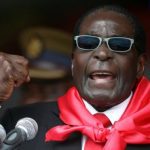
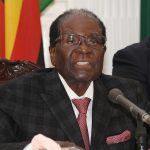
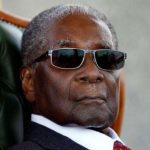
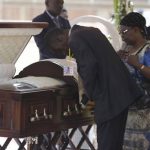

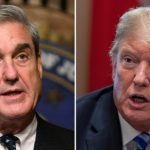





I don’t kno why African leader don’t think they like me and only forget that the post is not a tranditional post that u and your clans had baba had do justice to the citizens given them too opportunity and equally kno that even If is an inch whom had edge you if baba can flash back to his statement at a submit when addressing greverance matter how the thing pain approach systematically not authoritatively cos those people will be the one working against you but u think their your friend na lie
this is lesson for all African leader think of that rural dwellers that u think they can up to your child God kno how to make things work for the poor
relax baba age had already come no profit they would gain in killing you God had already bless you
I don’t kno why African leader don’t think they like me and only forget that the post is not a tranditional post that u and your clans had baba had do justice to the citizens given them too opportunity and equally kno that even If is an inch whom had edge you if baba can flash back to his statement at a submit when addressing greverance matter how the thing pain approach systematically not authoritatively cos those people will be the one working against you but u think their your friend na lie
this is lesson for all African leader think of that rural dwellers that u think they can up to your child God kno how to make things work for the poor
relax baba age had already come no profit they would gain in killing you God had already bless you